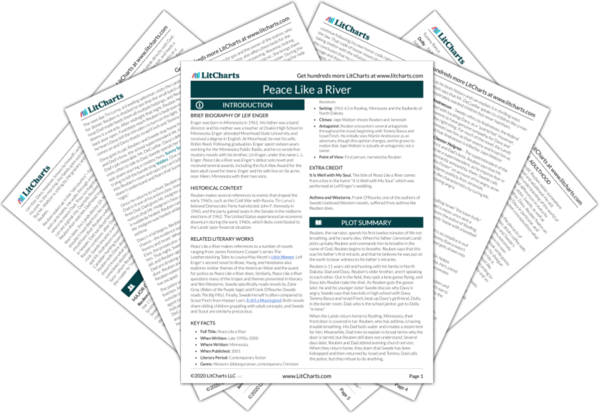Summary
Analysis
One day in January, Swede returns from the post office bearing a postcard from August Schultz. Apparently Davy stopped in to see the Schultzes, and August indicates that Andreeson visited them as well. While Swede is ready to head west immediately, Dad spends the next few days selling household items and buying canned food with the profits. Dr. Nokes watches Dad sell his bed and incredulously asks Dad what he's using for directions. Dad replies that he has the "substance of things hoped for." A few days later Dad burns his mattress in the backyard, and Reuben asks the reader how his family could've possibly lacked faith that God was guiding them.
The postcard from August is a sign that Dad's prayers are being answered; remember that they'd been planning on heading for Davy long before receiving the postcard. The postcard simply reinforces the power of religion and prayer to enact change in the real world. It also works to expand the loyalty to Davy outside of the Land family, as it implies that the Schultzes sheltered and protected Davy from the law.
Themes
Dad, Reuben, and Swede leave on January 22. They stop the Plymouth (their old car) at the post office so Dad can stop their mail, and Reuben wishes that Bethany Orchard would walk by and bestow upon him a goodbye kiss. Instead of Bethany, an old man lists up the street towards the post office. Swede points out that the man is Mr. Finch, Israel's grandfather. He looks unkempt and very cold as he struggles to pull open the door of the post office. Reuben wonders if the Finch family might've suffered a real loss at Israel's death.
Reuben wants to think of his family's journey as a grand adventure complete with romance. This is spoiled by Mr. Finch, however, as Reuben is forced to wonder if their trip isn't necessarily rooted in righteousness. This is a moment of uncomfortable maturity for Reuben as he continues the process of humanizing his "enemies" and their families, seeing them as full humans rather than one-dimensional villains.
Themes
The Lands head for North Dakota. Reuben remarks to the reader that he felt a little disappointed after the anticipation of the weeks before. Not long after they cross the border into North Dakota, Swede points out a black shape in the road ahead and asks what it is. As they get closer, they realize it's a dead crow. Dad mentions that he's never seen a dead crow in the road before. Minutes later, they pass another dead crow.
The never-before-seen dead crows suggest that the trip itself will be full of surprises and unknowns. They also illustrate just how cold it is, which will be an important thing to keep in mind going forward. The Lands aren't just fighting the law; they're fighting the elements and the West itself.
Themes
Dad, Reuben, and Swede reach August and Birdie's house late in the afternoon. Their arrival rouses Reuben from a nightmare in which Valdez had crawled into Reuben's bunk with him, but Reuben was unable to tell anyone. He cannot shake off the dream as Birdie unbundles him and Swede in her kitchen. Reuben feels scared and worried that Dad has even admitted that he doesn't know where they go from August's. He told Reuben they're like the Israelites leaving Egypt. Reuben tells the reader that sometimes you'd rather use a map than faith.
Valdez becomes even more sinister and his appearance in the nightmare means that he exists as more than just a fictional character in Swede's poem. This dream foreshadows the experience that Reuben will have in real life in North Dakota as he encounters villains he can't talk about. The fact that Reuben doesn't find Dad's comparison to the Israelites particularly comforting suggests that Reuben might be somewhat disillusioned with their trip already.
Themes
Get the entire Peace Like a River LitChart as a printable PDF.













